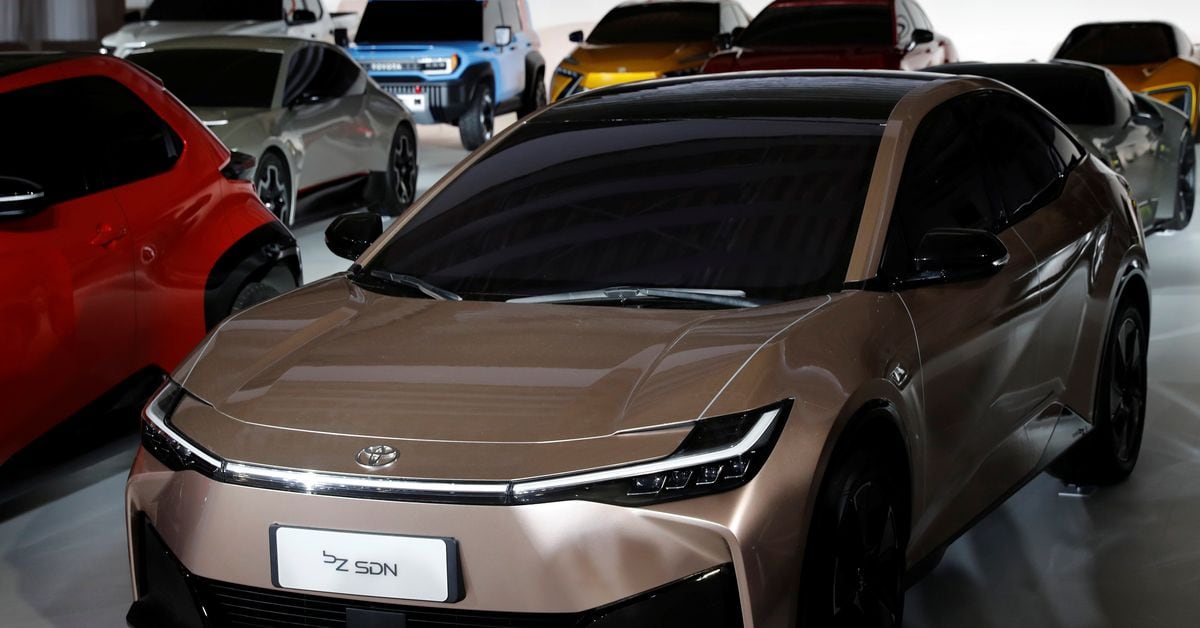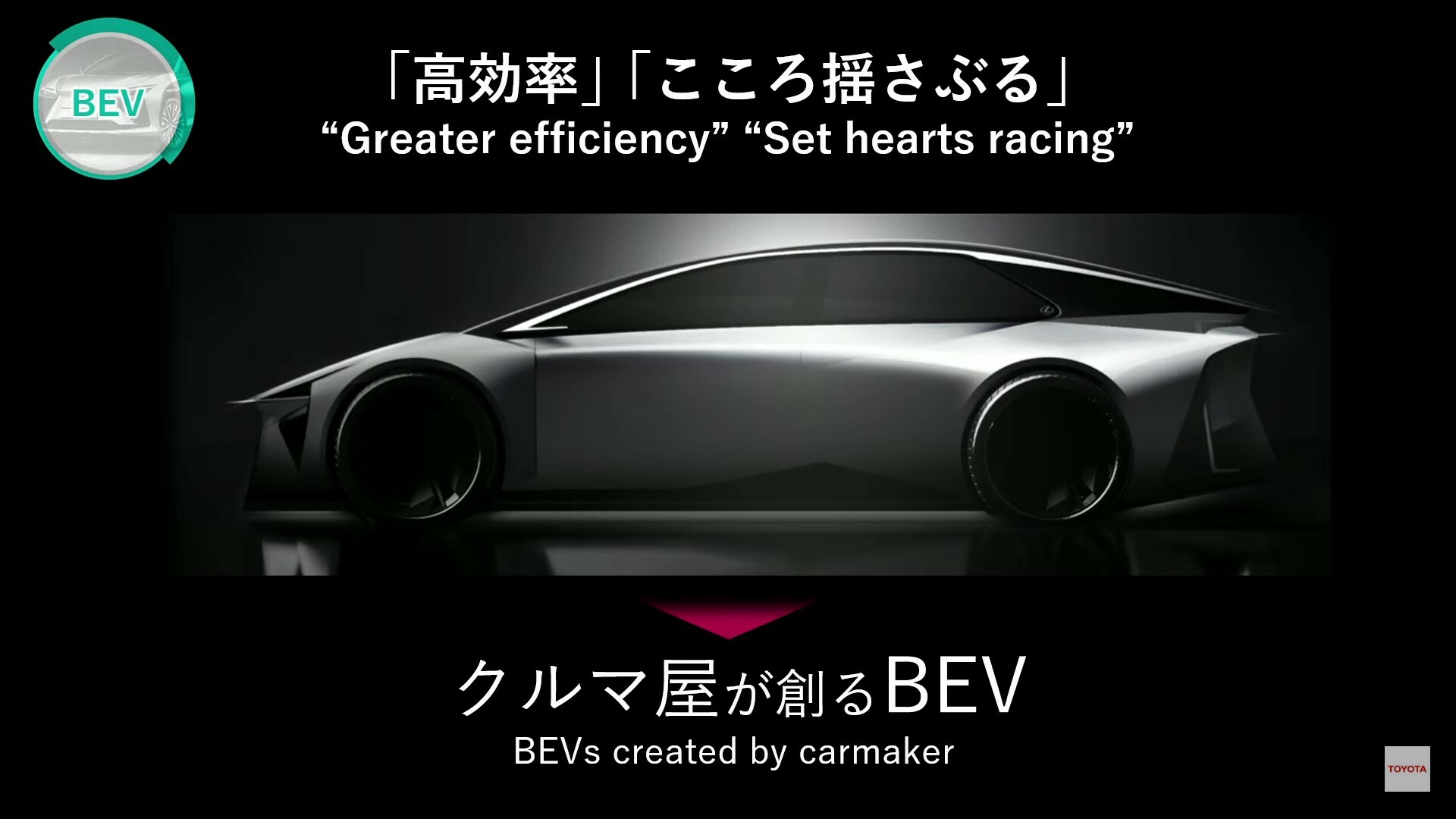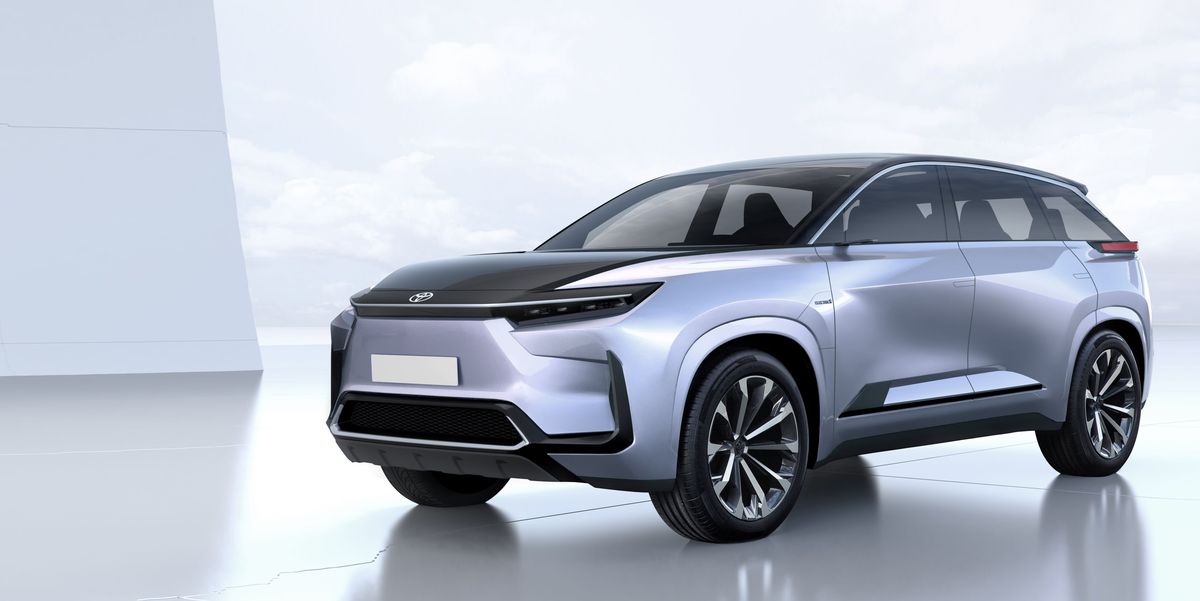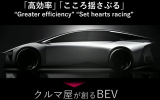You are using an out of date browser. It may not display this or other websites correctly.
You should upgrade or use an alternative browser.
You should upgrade or use an alternative browser.
Lexus Future BEV Thread
- Thread starter ssun30
- Start date
internalaudit
Expert
- Messages
- 1,145
- Reactions
- 1,137
Going to watched the hour-long presentation lol now that I am up.
Anything on battery technology?
Anything on battery technology?
internalaudit
Expert
- Messages
- 1,145
- Reactions
- 1,137
Sounds like 10 BEV models by 2026? Hopefully, there will be enough supply to go around. Wait times for HEVs, PHEVs and BEVs are crazy long in Canada. It's almost like JIT or even build after the customer order haha.
Toyota is taking the shot gun approach on propulsion systems, which is good.
New BEV unit, all in one team!
BEV production is limited by battery supply!
Toyota is taking the shot gun approach on propulsion systems, which is good.
New BEV unit, all in one team!
BEV production is limited by battery supply!
Last edited:
Yeah their were rumours circulating that mirai might get a hybrid powertrain and with them switching fcev to commercial it does make senseIs this our first glimpse of the next-gen LS BEV ("LZ")?
View attachment 6890
Also, 200km+ EV range PHEV planned in the future. (I think this is the most interesting part of the briefing)
Officially moved away from FCEV on passenger cars and focus on commercial vehicles instead.
mikeavelli
Moderator
- Messages
- 7,020
- Reactions
- 15,590
3 row EV crossover made in NC
Evolution of currant plants. Possible EV only plants
Lexus to lead EV charge
Complete rethink of EV engineering. evolution of E-TNGa
Will still offer a mix of offerings not EV only. Hoping for carbon neutrality
Hybrids now more profitable than ICE only vehicles
PHEV with 120 miles of range 😳
There is more that stuck out to me…..
Oh and that image is supposedly a Lexus fastback from what the press is saying
Evolution of currant plants. Possible EV only plants
Lexus to lead EV charge
Complete rethink of EV engineering. evolution of E-TNGa
Will still offer a mix of offerings not EV only. Hoping for carbon neutrality
Hybrids now more profitable than ICE only vehicles
PHEV with 120 miles of range 😳
There is more that stuck out to me…..
Oh and that image is supposedly a Lexus fastback from what the press is saying
Last edited:
internalaudit
Expert
- Messages
- 1,145
- Reactions
- 1,137
Fun to drive cars. ..

 www.reuters.com
www.reuters.com

Toyota to launch 10 new battery EV models by 2026
Toyota Motor Corp will introduce 10 new battery-powered models and target sales of 1.5 million EVs a year by 2026, aiming for steep growth in a market where it has long been lapped by rivals.
Last edited:

Toyota Unveils New Electrification Strategy And Plans For 10 Next-Gen EVs By 2026 | Carscoops
In his first news conference as Toyota's new CEO, Koji Sato said that the company, along with Lexus, aims to sell 1.5 million battery electric vehicles annually by 2026
Here is a summary of the new electrification strategy:
- Greater emphasis on the development of battery electric vehicles (BEVs) compared to the previous management
- Launch 10 new battery electric vehicles (BEVs) by 2026
- New estimate of selling 1.5 million BEVs per year by 2026
- New 3-row SUV to be produced in the US, with batteries from the North Carolina plant
- Ready for production (some already previewed as concepts, including Tacoma EV, Crown EVs, bZ Compact SUV):
- 2 new EVs for China for launch in 2024 (joining the bZ4X SUV and the bZ3 sedan China)
- Small EV and fully electric pickup trucks for Asia and other emerging markets to enter production by the end of 2023
- Next-generation battery electric vehicles (BEVs) to arrive after 2026, combining greater efficiency with even more exciting driving characteristics, offering “double the range by using batteries with far greater efficiency”
- Hiroki Nakajima, Executive Vice President of Toyota announces formation of new, specialized unit at Toyota, led by a “single leader with full authority”, responsible for all aspects of the development, production, and business operations related to electric vehicles, an “all-in-one team” to handle every function related to EVs
- Continue to make its hybrid vehicles more efficient and affordable and offering plug-in hybrids with an extended EV-only range of over 200 km (124 miles)
- Continue pursuing development of hydrogen and other alternative fuels
- Regional priorities:
- Large SUVs and pickups for America
- Driver-orientated cars for Europe
- Compact vehicles and minivans for Japan
- Electrification for China
- Focus on quality, reliability, and affordability for global South
F1 Silver Arrows
Expert
- Messages
- 2,333
- Reactions
- 3,778
Like do we really even need EVs at this point if they're going to offer PHEVs that have over 200km range?Continue to make its hybrid vehicles more efficient and affordable and offering plug-in hybrids with an extended EV-only range of over 200 km (124 miles)
If anything this tells me we're going to have our vroom vrooms for practically the foreseeable future and that makes me happy.
This makes me happy too.Continue pursuing development of hydrogen and other alternative fuels
Like do we really even need EVs at this point if they're going to offer PHEVs that have over 200km range?
If anything this tells me we're going to have our vroom vrooms for practically the foreseeable future and that makes me happy.
This makes me happy too.
efuel pls.
Why would anyone buy an EV if this existed? WOW! I love PHEVs, have had plugin Prius and RAV4 Prime (and 2 Teslas). PHEV makes a lot of sense but most have so little EV range they just aren't desirable.Continue to make its hybrid vehicles more efficient and affordable and offering plug-in hybrids with an extended EV-only range of over 200 km (124 miles)
It's unfortunate that government regulations, government (taxpayer) buying incentives and Tesla "cool" factor has resulted in so many people becoming so closed minded on future technologies.
internalaudit
Expert
- Messages
- 1,145
- Reactions
- 1,137
Anyone believe Tesla will come up with a $29K model?
What else is there to remove, double wishbone suspension, purely exclude radar and lidar? The 3 is already bare bones.

 www.caranddriver.com
www.caranddriver.com
What else is there to remove, double wishbone suspension, purely exclude radar and lidar? The 3 is already bare bones.

Toyota Three-Row Electric SUV to Be Built on U.S. Soil in 2025
Along with introducing 10 new EVs globally by 2026, the company says next-gen models will have double the driving range.
Last edited:
LateToLexus
Follower
- Messages
- 139
- Reactions
- 154
I'm not really battery literate. Will this purported doubling in battery range/efficiency also mean a dramatic decrease in charging times?
While we've entertained an electric vehicle, the time difference between charging an electric vehicle and gassing up an ICE is a big deterrent for us.
While we've entertained an electric vehicle, the time difference between charging an electric vehicle and gassing up an ICE is a big deterrent for us.
mikeavelli
Moderator
- Messages
- 7,020
- Reactions
- 15,590
I'm not really battery literate. Will this purported doubling in battery range/efficiency also mean a dramatic decrease in charging times?
While we've entertained an electric vehicle, the time difference between charging an electric vehicle and gassing up an ICE is a big deterrent for us.
Yes. As the tech improves battery charging will improve. The biggest increase will be for fast charging to get to 80% in hopefully around 20 minutes.
That was my first thought also. But it got me thinking what trade-offs were (or will be) necessary in order to combine a battery big enough to provide 200km of range AND an internal combustion engine.Why would anyone buy an EV if this existed? WOW! I love PHEVs, have had plugin Prius and RAV4 Prime (and 2 Teslas). PHEV makes a lot of sense but most have so little EV range they just aren't desirable.
Is this only possible with the perfect high-capacity solid-state battery? When will that battery come? And if it is that good, do we need an ICE range extender?
What about that range extender? Is it only a small, weak serial-hybrid range extender that will never drive the wheels, and not the more-powerful engine in the serial-parallel hybrid that enthusiasts have come to rely upon when we need more power?
Range extenders are extremely inefficient unless it's a dedicated generator design like Toyota's free-piston linear generator. I wonder what happened to that project. It has a tank-to-battery efficiency of 40% and produces 15kW/cylinder. So for continuous driving 2 cylinders are needed for a compact car and 4 cylinders for a 3-row SUV.What about that range extender? Is it only a small, weak serial-hybrid range extender that will never drive the wheels, and not the more-powerful engine in the serial-parallel hybrid that enthusiasts have come to rely upon when we need more power?
Mazda MX-30 PHEV has a 830cc rotary making only 20kW and has a fuel efficiency of 27 MPG when the battery is depleted. That is embarrassingly inefficient. Not even the most dedicated rotary fan would want to buy a 27hp 27MPG car with a rotary engine.
A full 50L tank and 17.8kWh battery gives the MX-30 600km range in WLTP cycle. The Prius Prime gets 940km EPA cycle range with a full 40L tank and 13.6kWh battery AND has 60 more horsepower.
I'm imagining a Prius Prime with a 350V solid-state battery with ~80Ah capacity for a total of 28kWh and 112kW@4C. Using a energy density of 400Wh/kg the battery cells would weigh only 70kg and the entire pack at 117kg assuming 60% packing efficiency. That's 13kg lighter than current Prius Prime's 130kg battery. The ICE side doesn't need to be changed at all. It could be a drop-in upgrade together with a faster level 2 charger (mayba 240V@48A).
Last edited:
The 2026 new architecture will be 800V and supports up to 350kW charging with CCS 2.0 but realistically the time savings is ~40% vs. a 150kW charger (charging curves for batteries are not linear). So it would still take ~18-25min to charge 10-80% depending on battery size.I'm not really battery literate. Will this purported doubling in battery range/efficiency also mean a dramatic decrease in charging times?
While we've entertained an electric vehicle, the time difference between charging an electric vehicle and gassing up an ICE is a big deterrent for us.
ChaDeMo 3.0/Chaoji supports up to 900kW charging @1.5kV so theoretically a car can be charged in 5 min but I doubt that number would be achievable this decade. It's way too high C-rate and maybe only designed for charging semi-trucks. Plus the charging cable would require cryogenic cooling to handle the heat. I haven't seen any car company planning to introduce 1kV+ architecture for BEVs because of safety concerns.
-
This site uses cookies to help personalise content, tailor your experience and to keep you logged in if you register.
By continuing to use this site, you are consenting to our use of cookies.


